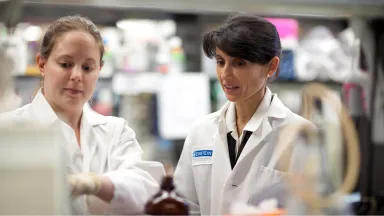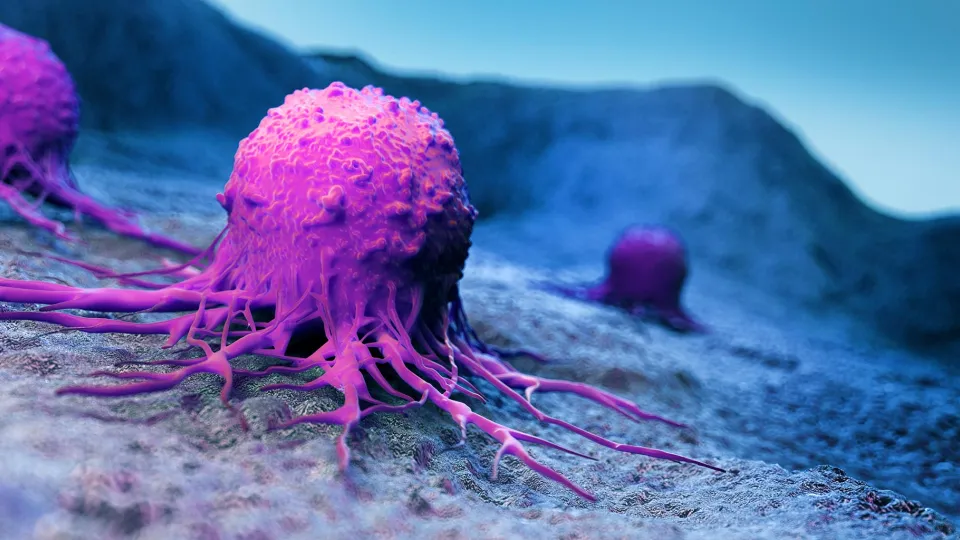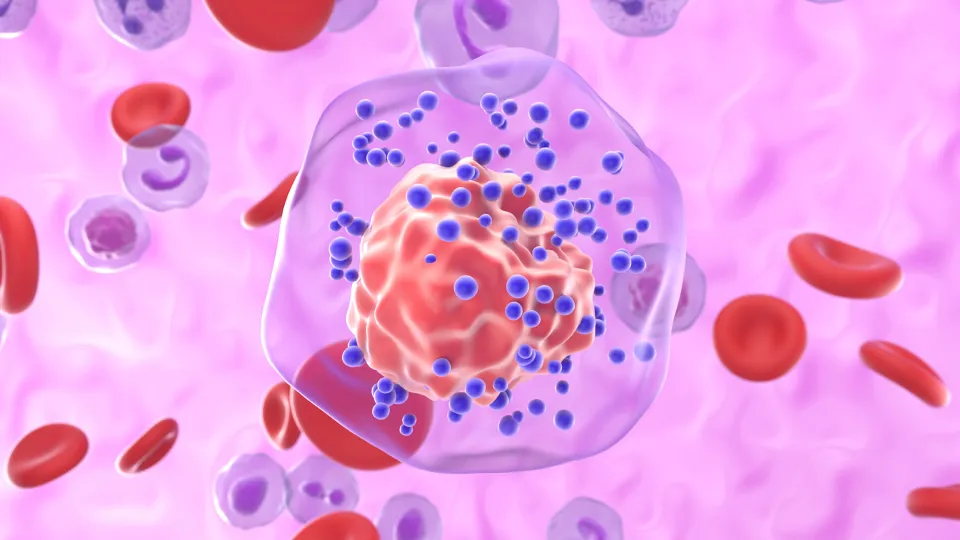
Wenjun Guo, Ph.D.
- Professor, Department of Cell Biology
Area of research
- Cancer stem cells, mammary stem cells, tumor immune microenvironment, immunotherapy, cellular plasticity, metastasis, therapeutic resistance
Phone
Location
- Albert Einstein College of Medicine Michael F. Price Center 1301 Morris Park Avenue 122 Bronx, NY 10461
Research Profiles
Professional Interests
My lab is interested in two interlocking areas of stem cell biology and cancer biology: the molecular pathways that regulate the stem-cell fate and plasticity in tissue homeostasis and regeneration, and the role of stem cell fate/pathway dysregulation in breast cancer pathogenesis.
Role of stem cell plasticity in tumorigenesis
Using in vitro organoid culture and in vivo lineage tracing strategies, we have identified novel unipotent stem/progenitor cells that are responsible for the development of distinct mammary epithelial cell lineages and may serve as origins of distinct breast cancer subtypes. We have also uncovered a crucial role of de-differentiation of these unipotent cells to multipotent stem-like cells in breast cancer malignant progression. Our ongoing work focuses on determining the mechanisms of de-differentiation to multipotency, dissecting the interaction of de-differentiated stem-like cells with the host immune system, developing strategies for targeting these pre-cancer stem cells.
Function of stem-cell pathways in breast cancer progression and metastasis
Emerging evidence suggests that normal stem-cell pathways often get activated aberrantly in cancers and contribute to aggressive cancer behaviors. Identification of key normal stem cell regulators provides us a framework to understand how breast cancer stem cells are regulated. We are particularly interested in understanding the role of stem-cell regulators in controlling metastatic colonization, a rate-limiting step of the metastatic cascade that involves cancer stem cells. We recently identified a key role of epigenetic regulator MLL3 mutation in enhancing stem cell activity and promoting the formation of aggressive cancer cells with hybrid epithelial-mesenchymal characteristics. In addition, we are interested in how cancer stem cells are regulated by and interact with the tumor immune microenvironment.
Selected Publications
- Boutet M#, Nishitani K#, Couturier N&, Erler P&, Zhang Z, Militello A, De Miranda M, Barbieux E, Guillen E, Leavenworth J, Suzuki M, Sparano J, Lu J, Fineberg S, Wang Y, Mani S, Montagna C, Guo W* and Lauvau G*. Mutations in MLL3 promote breast cancer progression via HIF1α-dependent intratumoral recruitment and differentiation of regulatory T cells. Immunity, 2025; doi: 10.1016/j.immuni.2025.07.008. PMID: 40749665. (*Co-corresponding)
- Liu Y, John P, Nishitani K, Cui J, Nishimura CD, Christin JR, Couturier N, Ren X, Wei Y, Pulanco MC, Galbo PM Jr, Zhang X, Fu W, Cui W, Bartholdy BA, Zheng D, Lauvau G, Fineberg SA, Oktay MH, Zang X*, and Guo W*. A SOX9-B7x axis safeguards dedifferentiated tumor cells from immune surveillance to drive breast cancer progression, Developmental Cell, 2023; 58(23):2700-2717.e12. PMID: 37963469.
- Cui J*, Christin JR, Reisz JA, Cendali FI, Sanawar R, De Miranda MC, D'Alessandro A, and Guo W*. Targeting ABCA12-controlled ceramide hemeostasis inhibits breast cancer stem cell function and chemoresistance. Science Advances, 2023; 9(48):eadh1891.PMID: 38039374.
- Cui J, Zhang C, Lee JE, Bartholdy BA, Yang D, Liu Y, Erler P, Galbo PM Jr, Hodge DQ, Huangfu D, Zheng D, Ge K, Guo W. (2023) MLL3 loss drives metastasis by promoting a hybrid epithelial-mesenchymal transition state. Nature Cell Biology, 2023; 25(1):145-158. PMID: 36604594.
- Christin JR#, Wang C#, Chung CY, Liu Y, Dravis C, Tang W, Oktay MH, Wahl GM, Guo W. Stem cell determinant SOX9 promotes lineage plasticity and progression in basal-like breast cancer. Cell Reports, 2020; 31(10):107742. PMID: 32521267.
- Hodge DQ, Cui J, Gamble MJ, Guo W. Histone variant macroH2A1 plays an isoform-specific role in suppressing epithelial-mesenchymal transition. Scientific Reports, 2018; 8(1):841. PMID: 29339820.
- Wang C, Christin JR, Oktay MH, Guo W. Lineage-biased stem cells maintain estrogen-receptor-positive and -negative mouse mammary luminal lineages. Cell Reports, 2017; 18(12): 2825-2835. PMID: 28329676.
- Zhang Z, Christin JR, Wang C, Ge K, Oktay MH, Guo W. (2016) Mammary-stem-cell-based somatic mouse models reveal breast cancer drivers causing cell fate dysregulation. Cell Reports, 2016; 16(12): 3146-3156. PMID: 27653681.
- Guo W. Breast cancer stem cells: regulatory networks, stem cell niches, and disease relevance. Stem Cells Translational Medicine, 2014; 3(8):942-948. PMID: 24904174.
- Guo W, Keckesova Z, DonaherJ, Shibue T, Tischler V, Reinhardt F, Itzkovitz S, Noske A, Zürrer-Härdi U, Bell G, Tam WL, Mani SA, van Oudenaarden A, Weinberg RA. Slug and Sox9 cooperatively determine the mammary stem cell state. Cell, 2012; 148(5): 1015-1028. PMID: 22385965.
- Mani SA*, Guo W*, Liao MJ*, Eaton EN, Ayyanan A, Zhou A, Brooks M, Reinhard F, Zhang CC, Shipitsin M, Campell LL, Polyak K, Brisken C, Yang J, Weinberg RA. The epithelial-mesenchymal transition generates cells with properties of stem cells. Cell, 2008; 133(4): 704-715. PMID: 18485877. (*co-first author)
- Guo W, Pylayeva Y, Pepe A, Yoshioka T, Muller WJ, Inghirami G, Giancotti FG. Beta 4 integrin amplifies ErbB2 signaling to promote mammary tumorigenesis. Cell, 2006;126(3): 489-502. PMID: 16901783.







